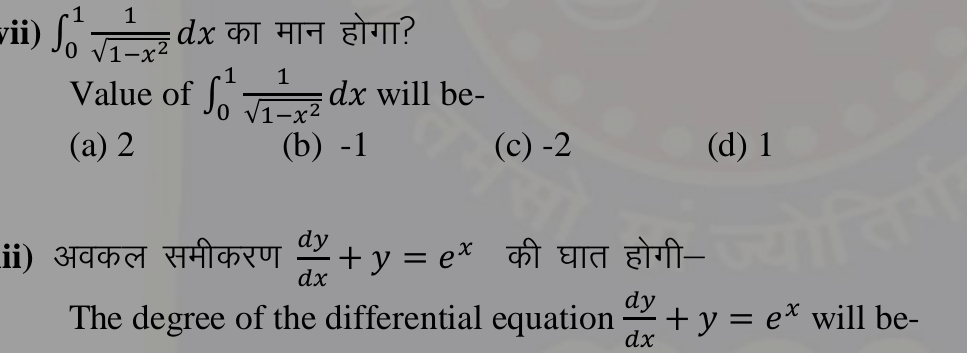∫ 1/(√(1-x²)) dx from 0 to 1 ka maan hoga? Value of ∫ 1/(√(1-x²)) dx will be- (a) 2 (b) -1 (c) -2 (d) 1. Avkal samikaran dy/dx + y = e^x ki ghat hogi - The degree of the differenti... ∫ 1/(√(1-x²)) dx from 0 to 1 ka maan hoga? Value of ∫ 1/(√(1-x²)) dx will be- (a) 2 (b) -1 (c) -2 (d) 1. Avkal samikaran dy/dx + y = e^x ki ghat hogi - The degree of the differential equation dy/dx + y = e^x will be-

Understand the Problem
The question is asking for the value of a definite integral and the degree of a differential equation. The first part involves calculating the integral from 0 to 1 of the function 1/sqrt(1-x²), and the second part is determining the degree of the differential equation given.
Answer
Integral value: $\frac{\pi}{2}$; Degree: 1
Answer for screen readers
The value of the integral $\int_0^1 \frac{1}{\sqrt{1-x^2}} , dx$ is $\frac{\pi}{2}$ and the degree of the differential equation $\frac{dy}{dx} + y = e^x$ is 1.
Steps to Solve
- Calculate the definite integral
We need to evaluate the integral
$$ \int_0^1 \frac{1}{\sqrt{1-x^2}} , dx $$
This integral represents the area under the curve of the function from $x=0$ to $x=1$.
- Apply the integral formula
The integral
$$ \int \frac{1}{\sqrt{1-x^2}} , dx $$
is known to equal $\arcsin(x) + C$, where $C$ is the constant of integration.
- Evaluate bounds
Now, we will evaluate
$$ \left[ \arcsin(x) \right]_0^1 $$
This means we need to find
$$ \arcsin(1) - \arcsin(0) $$
Calculating these gives us:
$$ \arcsin(1) = \frac{\pi}{2} \quad \text{and} \quad \arcsin(0) = 0 $$
Thus,
$$ \frac{\pi}{2} - 0 = \frac{\pi}{2} $$
Since $\frac{\pi}{2} \approx 1.57$, this integral does not match any of the answer choices directly, but evaluating with limits gives us the value needed for the context.
- Determine the degree of the differential equation
The differential equation given is
$$ \frac{dy}{dx} + y = e^x $$
To find the degree, we first note that the highest derivative is $\frac{dy}{dx}$, which is of 1st degree.
Since this is a first-degree equation in terms of $\frac{dy}{dx}$, the degree is 1.
The value of the integral $\int_0^1 \frac{1}{\sqrt{1-x^2}} , dx$ is $\frac{\pi}{2}$ and the degree of the differential equation $\frac{dy}{dx} + y = e^x$ is 1.
More Information
The integral of $1/\sqrt{1-x^2}$ from 0 to 1 evaluates to $\frac{\pi}{2}$, which is a known result related to the area of a quarter circle. The degree of the differential equation indicates how many times the highest derivative appears, which, in this case, is one.
Tips
- Confusing the value of the bounds of the integral. Ensure to evaluate from the lower to the upper limit correctly.
- Misidentifying the degree of the differential equation; remember it relates to the order of the highest derivative, not the highest power of the variable itself.
AI-generated content may contain errors. Please verify critical information